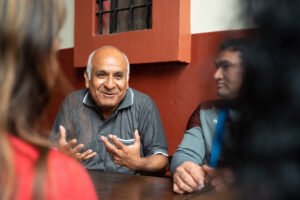
From conflict to win-win: 10 years of building social dialogue in Peru
By Mondiaal FNV
Looking at innocuous blueberries, avocados and asparagus in our supermarkets, you wouldn’t expect they originate from a workplace full of strife in Peru. Yet, that was the stark reality. The country has a history of mistrust and confrontations between employers and employees, often resulting in conflicts, even violence. It took over 10 years of support and facilitations by Mondiaal FNV, in collaboration with Dutch Employers’ Cooperation Programme (DECP) and the Labour Foundation, to build a social dialogue between trade unions and employers. This effort was so effective that it even succeeded in bringing employees who had been fired for unionizing back to the negotiation table. How did they turn this struggle into a win-win situation?
Local key players
A cultural shift through genuine engagement and patience was needed. Samuel Machacuay, a local consultant for Mondiaal FNV in Peru for seventeen years, played a pivotal role in this transformation. The way he sees it: “Peru lacks a culture of dialogue; we inherently distrust each other. I knew that something needed to change, but shifting this fundamental mistrust into a sustainable relationship between both parties felt like a massive challenge.”
So where to start? They began with the few leaders from both the union and the employer sides who were already in conversation with each other, those who had a personal connection and were open to building a sustainable dialogue. Together with Mondiaal FNV, they came up with the idea of learning more about social dialogue in the Netherlands: the polder model.

“Looking back on ten years of social dialogue in Peru, I think of the people: they are the soul of change. Their personal commitment, the fact that they know each other, laugh together, trust each other – that is change. It makes me proud to see that,” – Samuel Machacuay
Learning how to polder model
CGTP (Peru’s trade union federation) and Mondiaal FNV invited people from both the employers and workers’ side to travel to the Netherlands. It was incredibly exciting to invite these two groups, who were so different, to travel together. Each person received an invitation that went beyond formal obligations – they were there as Peruvians driven by the desire to contribute to the country’s development. From the very start, it was noticeble that employers were seeking closer ties: they invited everyone to the airport lounge, and they all wanted to sit next to each other on the plane. In the Netherlands, Carmela Sifuentes representing the CGTP workers’ organisation, and Luis Salazar from the SNI employers’ organisation, took the momentous step of founding a Labour Foundation – a truly symbolic occasion. That marked the beginning of a remarkable journey where insight into processes of dialogue and negotiation were gained.
At every stage trust is key
Trust has been the key throughout this process, and building trust takes time. The trust that existed between a few individuals had to gradually expand to the entire system. Employers and workers were invited to informal discussions, practiced win-win negotiations, trained union leaders who then trained others. The occasional moments of discussion became regular, and the Asociación para el Trabajo – the Peruvian equivalent of the Labour Foundation – became a reality. Employers and workers are increasingly able and willing to put themselves in each other’s shoes: there’s mutual understanding and respect. Peru has made some huge steps: from a culture of mistrust there is now genuine social dialogue between employers and workers in many places.
The path of social dialogue is still a long road in which there is still much to improve, but I am confident that the young employers and workers are capable of taking over the flag and ensuring an even better future for workers, businesses and thus our country!” – Samual Machacuay
From getting fired to improved labour agreement
Geraldine Espinoza, despite a rough start, played a key role in shaping the shift in labour relations in her company. Poor working conditions at the pharmaceutical company prompted her and a group of colleagues to take the leap initially. Retaliation came quickly; “after nine years of loyal service, I was dismissed for founding a union” Not one to back down, Geraldine rose to the challenge of making ends meet and fought to get her job back. She succeeded and pursued various training programs, including the social dialogue training by Mondiaal FNV.
“The most important thing I learned from the training is the significance of trust. Mutual respect is another crucial requirement for social dialogue. It demands the ability to empathize with others.” – Geraldine Espinoza
At new collective agreement negotiations, Geraldine put everything she learned into practice. Her union had been futilely trying to negotiate with the employer for years. But this time it all finally came together and they achieved good results! “We accomplished a lot: like a five-year bonus, contributions to contribution to education and a higher salary. But most importantly, we now have a permanent dialogue with the employer in the form of a monthly meeting. The atmosphere at my workplace is completely different now.” A transformation that extends across various sectors, including the fruit and vegetable sector. The development of social dialogue was a long-term process, but it resulted in systemic change; workers and employers engage in periodic discussions and make agreements now, making for a better workplace for all.